#about solarpunk shit
Text
You know what, while I'm doing hot takes. And this one may be obvious considering I'm actively contributing to hosting the Solarpunk Aesthetic Week event but like.
Dear everyone who's constantly deriding the aesthetic portions of the solarpunk movement/genre; do you just not understand that being able to visualize the future you want is immensely important to being able to work towards it? Being able to get other people on board with it?
When I first got interested in Solarpunk, it wasn't for the hot leftist takes about the top ways to dismantle the government for the people, or top tips on how to build your own solar panel apparatuses. What brought me in? Visions of a hopeful future. I learned and began to love the rest as I dove deeper into solarpunk circles, but there is no denying that my first intro to it--and likely many people's first intro to it--was via the art and aesthetic spheres. The term 'solarpunk' was literally coined to refer to the aesthetic movement, and we've been building up from there ever since.
'When are people going to realize the aesthetic parts don't matter and what really matters is praxis--' dude, the aesthetic parts do matter. Inspiring people does matter. Showing people visions of a hopeful future is immensely important, it's why so many people join this movement. We see glimpses of what a hopeful future could look like, through beautiful art or riveting stories, we're inspired by things like stained glass and organic designs and statues and fashion concepts--and then we think to ourselves 'how can we help make this future happen?' And we learn the praxis and we work towards the goals and we share it with others because that's just how we work.
Seeing isn't always believing, but sometimes in order to believe in something with your whole heart, it helps to be able to visualize what you want. For yourself and for others.
So yes. The aesthetic parts of solarpunk do matter. Thank you for coming to my TEDTalk.
#solarpunk#out of queue#ani rambles#honestly in my opinion if the younger me saw posts saying shit like 'the aesthetic part of solarpunk is stupid and unimportant'#that would have chased me away more than anything.#A movement like this? the last thing we want is to chase people away! We want people to get excited!#We want people to get on board eagerly and wholeheartedly!#Yes I'm sure some people got into solarpunk praxis-first aesthetic-later (or maybe even aesthetic-never)#But that's no reason to deride the people who got in here aesthetic-first praxis-later#solarpunk is beautiful BECAUSE there's so many ways to learn about it and visualize it#anyways everyone get hype about solarpunk aesthetic week a month from now!!!#honestly might delete later who knows
4K notes
·
View notes
Text
I desperately need more botany/gardening/solarpunk/foraging posts that aren’t so fucking American-centric
“European plants are invasive” okay, in America— but which ones are invasive HERE, like are Spanish species invasive to England? Are French plants invasive to England??
#we’re a fucking island but we’re also in Europe and I need more shit about wildflowers or invasive species or edible foraging plants in UK#wild flowers#wildflowers#england#scotland#ireland#wales#including those three too cause it’s probably a very similar issue#I mean maybe I’m just not looking in the right places but everything I ever come across is American or Canadian#UK#solarpunk#botany#foraging#foragecore#foraged food#🪲#botanic garden#garden design
254 notes
·
View notes
Text
What'll happen if I just...put my food scraps in a random container right now and gradually turn it into a more proper compost thing? How quickly will I need to do something else to it to have it become something vaguely useful?
Unnecessary info: I always hate throwing food scraps away, but today I had such a nice experience eating berries outside and when I walked around outside I actually felt positive feelings which hasn't happened really at all recently? So it felt so incorrect to walk away without at least returning the remnants to nature rather than chucking them in the trash. But I don't have the materials or executive function to do anything besides....Put It Somewhere. I thought about putting it in one of the random plants outside, but it feels questionable to just shove my food scraps in someone else's plants. Idk how you're choosing to raise your plants, idek if something bad could happen. Maybe the lemon tree, since it's already got lemons on the ground around it, but again, it's still Not Mine and very much Is Someone Else's. Whatever I end up doing, it'll probably need to be contained to a....container, and a pretty small (and definitely cheap) one at that, because I'm renting a room here, it's functionally Not My Yard, and the yard is 92% concrete. I'm just keeping the bowl of berry bits in my room at the moment until I figure out what to do 😅
#composting#gardening#food waste#solarpunk#ecopunk#realistically I don't think the owners of this house would give a shit if i put a handful of berry parts near their lemon tree#so i think ill probably do that if i cant find another option#but this could be a good chance to finally start composting so i wanna see if the people of the internet can help me get past hard part no.1#any info is appreciated!#i saw a post about how composting can still be plenty effective without being ~optimized~ and that's the kind of thing im looking for#tyia!
53 notes
·
View notes
Text
While I'm in a rental and I know it can't be guaranteed to stay, I'm going to plant Richmond Birdwing Vine (pararistolochia praevenosa), Purple Violet (viola betonicifolia), and Native Violet (viola hederacea).
They're the host plants for the Richmond Birdwing and Australian Fritillary butterflies, and I keep seeing that post about a man in America who helped out significantly I think with the California pipevine swallowtail.
There's so much I can't do to help with the environment, but planting a vine I'll need to trim in my own yard alongside a handful of other native plants and having a bit of a veggie garden helps myself, my family, and some animals in the area.
#the solarpunk stuff I see is#well it's frequently all art#and when it's not it's things that feel unattainable/insurmountable to do on top of my daily life#I've a full time job and I have to factor in travel to and from that job (public transport here is shit so it takes about an hour each way)#and then maintaining the house in my free time on what little energy I have left#it feels insane to think 'well I also want to grow more food and store it and make a solar dehydrator and make more food from scratch and#get in touch with people in the community that are like minded. and get mad at our local government for its shitty maintenance of the lake#that has been cautioned against people swimming in it bc it'll make you sick#and this and that and everything else and visible mending also#fuck#so#I'm planting some new plants and impatiently waiting for my tomatoes and that's enough for now 😌
18 notes
·
View notes
Text
Privilege
Being born privileged means you have been born outside of at least a few of capitalist society's locked cages of class. With that privilege, if you have even the shadow of a conscience, comes a moral obligation to start picking other people's locks
#hopepunk#hopecore#solarpunk#peaceful revolution#greenhorizon#anti capitalism#climate change solutions#naturecore#forestcore#lunarpunk#what I'm trying to do#currently enquiring about funding for the charity#might try to crowdfund at some point#I have such shit people skills tho#ugh#the autism gets in the way again#anti fascism#activism#lgbt#queer community#poc
7 notes
·
View notes
Text
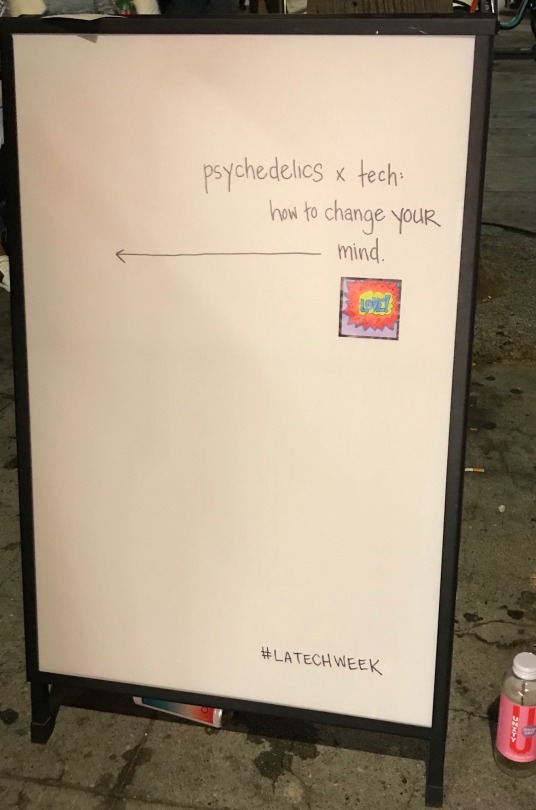





continuing to have an absolutely insane time over here living at a tech influencer house
#incessant meowing#picture journal#it’s la tech week and we’ve started going to parties for networking#i quickly realized that most people at these events are either fintech or startups#and they don’t need vr concept art#but they LOVE hearing me talk about what i do lol#they’re all like holy shit a real metaverse architect!! like snow crash!#and i’m just like through gritted teeth ‘yes... :) like snow crash’#i did meet two people who said they were into permaculture#and solarpunk based on indigenous practices#so that was cool#ANYWAYS idk what’s going on!! how’d i get here!!!!! wtf!!!!!!!!
55 notes
·
View notes
Note
can I call you "dude" it is automatic for me and if not let me know what I can call you eeeeeeeeee
ALSO ! oh my GOD have you seen cold frame gardening it's super cool I want to grow strawberries in the winter
It does occur to me that I have never given pronouns or a name on this place?? Dude is A-okay with me! Typically I go by Hunny in my everyday but other blogs have used Sunny in the past I guess its never occured to me ppl would wanna address me before haha
I typically use She/Her pronouns but Im good with anything although im pretty sure its obvious I am pretty femme in general.
7 notes
·
View notes
Text
Sorry I just can't stop thinking about the absolute bananas lack of imagination on that "if you could have a robot body" post from a while ago. Like the question was basically "if you could magically turn into a robot" and people were ascribing real world current technology to it. "Oh you couldn't touch anything and feel it" "you couldn't feel temperature" ???? Says fucking who??? You are making that up based on nothing. This is a magical scenario where you could replace your body and you're putting made up rules from what we currently understand of robotics onto it 😭 I would drop dead if I had such a limited scope of robotic technology in fantasy settings goddamn.
Reminds me of how when I'm like "I'm attracted to robots" and people think I mean like the remote controlled robot mascots car companies make and shit. No... dude no. Not all robots have to be the non-sentient AI crap invented by humans in our current age YOU ARE SO BORINGGGG
#had a very long discussion with a friend last night#about my Body Issues(tm)#the utter relief when he was the first person ever#to tell me he understood what I meant and knew what I was talking about#and he shared my frustration with so much sci-fi stuff#and introduced me to the concept of Solarpunk lol which is the shit of dreams as he described it!!#anyways I'm tired I want to take a nap
3 notes
·
View notes
Text
every passing second i become more sure of my decision to leave socmed to just make my neocities
#its gonna be about solarpunk and my writing.#but like i am nott staying. if twtusers start fucking shit up on here
3 notes
·
View notes
Text
"Oh no, someone's attracted to the aesthetics of my -punk movement but doesn't know the praxis and history behind it like I do--"
OK. Tell them. Make it a teaching moment. Everyone who's in your movement learned the background from somewhere at some point, maybe this is that point for that person. Give them a jumping off point that they can dive into later.
"Oh but I shouldn't be responsible for teaching baby -punks about the history and the how-tos and--"
OK. Then don't tell them. You don't have to be responsible for teaching people with a budding interest in your group the ins and outs and how-tos. That's fair and valid! It can be a lot of work. Someone else will handle it
"But I'm annoyed that they would try to claim to be part of/be interested in my community without knowing all the details that I know after being in it for months/years/decades, they're dumb, they're posers, they're--"
OK. Then don't engage with them, if it's that bad. Maybe someone else will come around and tell them the history, maybe they'll pick it up on their own, maybe they'll just enjoy the fashion elements for awhile.
"But they shouldn't claim to be part of the -punk community if they don't know the--"
I feel like we have a few options here. People can either talk to them, share the history, share the values, share the praxis. Or they can just chase off anyone who even thinks about dipping a toe in their community, and then wonder why it's dying off later down the line.
I dunno, maybe I'm too naive and patient or whatever. But if people are entering your -punk spaces without knowing The Rundown of what you feel they need to know, maybe being nice about it and informing people instead of immediately assuming stupidity and malicious intent could help you make a new friend. Even the loudest voices in a space had to learn from somewhere, and not everyone has the luxury of being in the space as the History was Happening--whether it's an age thing or a not being aware of the space thing. Or maybe I just don't see what the big deal is behind people hating people who like the aesthetic of something and don't know the behind the scenes history about it yet.
Because I believe in the word 'yet.' No one comes into this world knowing everything about everything, and we're all constantly learning new things. I'm not gonna degrade someone and call them a poser for not knowing what I know. Because if it were me, interested in a scene but getting chased out and called a poser? I wouldn't hit the books and study up, I'd go 'that fuckin sucks, those people sucked' and then avoid anyone and anything having to do with it.
So chase people off and call them posers if you want. But if your community starts dwindling, don't be fucking shocked.
#out of queue#ani rambles#punks and posers#i cant even call this a 4am hot take because its 7pm but like#idk i keep seeing posts about like 'how DARE people think I bought my punk clothes how DARE they not know the how-tos and DIYs'#or 'ugh people only care about the ~aesthetics~ of my movement if you don't know shit get out of here' and like#maybe I'm just a shy ass introverted nerd whos scared of social rejection! but I avoid that shit like the plague#so if someone were to reject me based on not knowing about something I'd never even heard about? something i was JUST getting into?#there's a high chance I'd just scram and never look back. i don't wanna be the one who causes that emotion in someone else#granted this is coming from someone who STILL doesn't know how to make her own patches or worked up the courage to do direct action praxis#outside of offering neighbors to my tomatoes and trying to talk to people about what I'm passionate about#but still imo unless someone's a malicious intentional bad actor i dont see the point in scaring newbies off#thats how movements die imo#i know this is my solarpunk blog but its not a solarpunk specific thing#i think the main post that inspired this was about store-bought versus self-made spiked leather jackets#which honestly just feels petty to me but who knows.#might delete later
2K notes
·
View notes
Text
went to talk to my guidance councillor about university and he immediately pinned me as the stoner kid who reads plato and will fight for the rights of a rock and prefers canon jesus to fanon jesus all the way so instead of talking about college we spent 70 minutes talking about anything from platos ideals and "Talos" to french people and how bad they are at everything and then i was late for my bus. I love him guys.
#The only thing i said was#“oh yeah i know about classics cause my dad used to study them and hed bring home like plato and fuckin vergil and shit”#And he fucking died on the spot#“i love how you mentioned some of the greatest academics in history and swore so aggressively afterwards”#Like sorry man im im a solarpunk stoner at me ig lmao
0 notes
Text
doodle dump of unreleased aus that r still actively in my Brain Often but i dont post shit about them
⚠️warning for old art and blood and injury drawn and death mentions⚠️
———
magic lily au:
main theme -

summary is that leo is transported to the samurai rabbit universe instead of his family’s arms through a trifecta of his ninpo, mikey’s mystics that begged for him to be safe, and the ki stone sensing a hero in need
when leo lands in the world, he doesnt know any japanese aside from simple phrases he grew up with; “thank you”, “please”, “excuse me”, “help me”, “i love you”, etc
him and yuichi fall in love and he remains there for a few years ! however . theyve all known since the beginning that the ki stone would take leo back once he was healed. she was clear on the fact he was only there to be helped , not to live there . so yuichi and leo hold off the inevitable, despite leo missing his family horribly and knowinf they think hes dead , despite knowing how selfish it was to have one more day with each other , they avoided the ki stone until they go to the temple together and leo is ripped from the world without even a chance to reallt say goodbye to everyone
uhhh etc etc they were their first and last loves as they were both on the aro spec and didnt have a need to find that kinda love again they just . wanted each other and blehhh
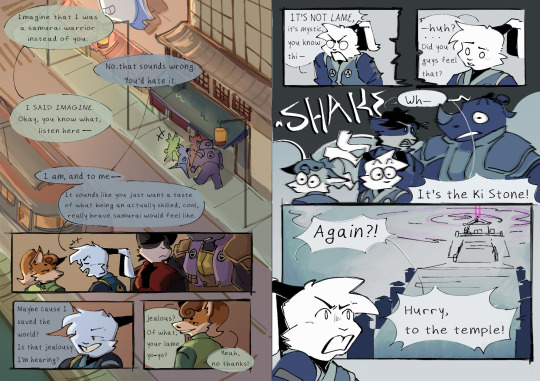
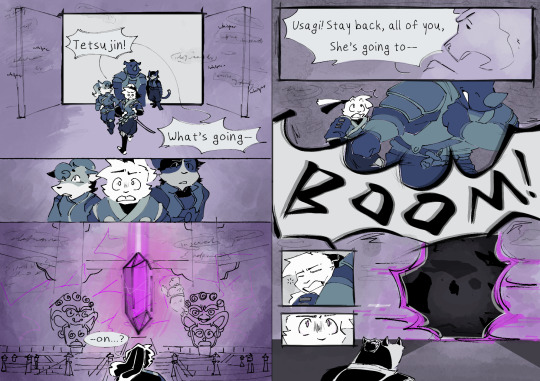
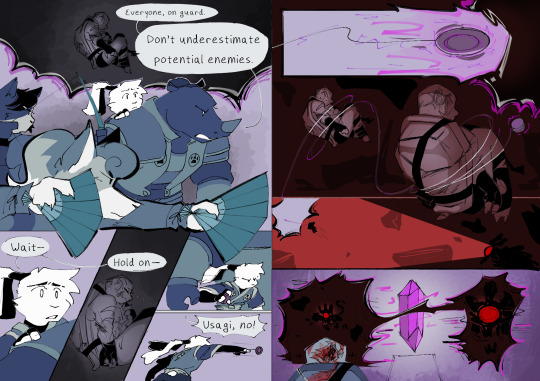
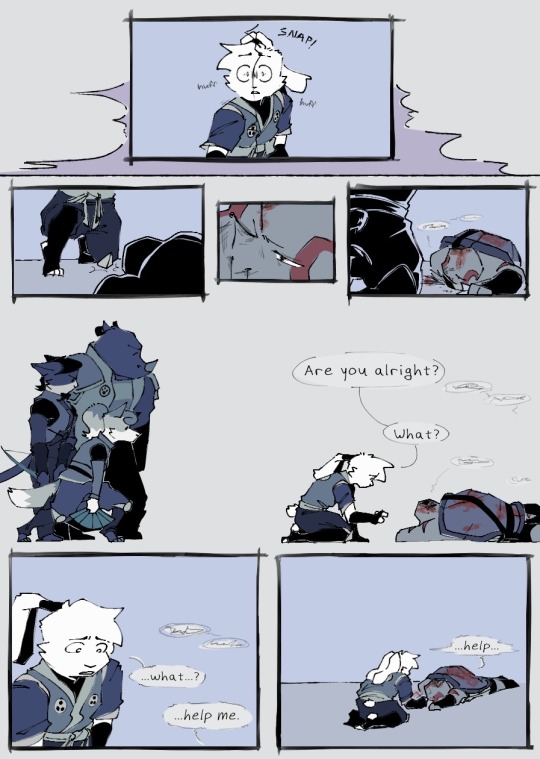

i have a playlist for it as well ! my oldest au , started since i got into the fandom
UUAU:
[temp name]
my original usagi/tmnt iteration with miyamoto usagi as the main protag ! i still want to create a comic and really officially send this out so i wont spoil a lot, but !
the basis is that usagi lives in a post apocolyptic solarpunk society and is forcibly sent back in time to a cyberpunk city where the seeds of a war have begun to sprout, dropped in the middle of the highest tensions between three turtles and their eldest brother who is on the enemy side
doomed siblings, doomed toxic yaoi, doomed Everything, its inspired by idw and 2003 so what else is there to expect

only showing the beta design for usagi ! i have a lot of other drawings for this but again, spoilers
historical graves au:
this one is the most recent of the bunch, just putting my version of yuichi for rise into a more usagi yojimbo styled setting ! the story is entirely different from the fanfic and im still working on it But
yuichi is the great grandchild of miyamoto usagi instead of a distant ancestor , so the debt of the shogun’s assassination is that much heavier and Far more dangerous to hold. yuichi and his adoptive little sister, hana, have recently escaped the mass murder and pillaging of their rabbit village (the same one that mariko and kenichi and usagi grew up in) and are on a journey to find their aunt for sanctuary
along the way, they run into a lot of familiar faces, such as the hamato clan , who has karai as their jōnin ! also yuichi gets possessed by jei at some point
hes trans too so he “disguises” himself as a boy to be more hidden as they travel
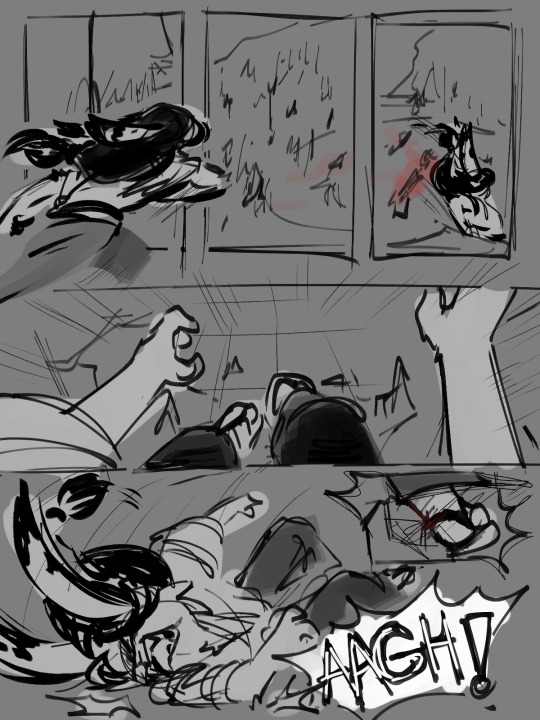
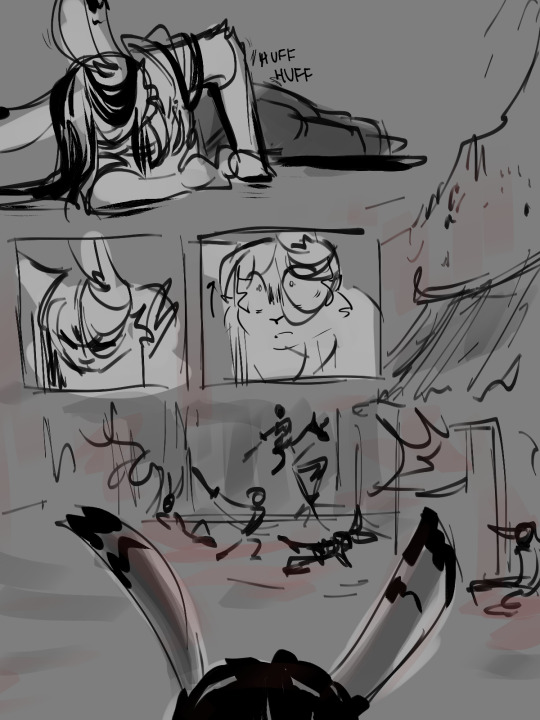

ive got one more original iteration but theres like . nothing i want to share from it rn lmao
SOOO THATS IT basicallt !!umm if anyone wants to know more about any of these aus id be happy to answer ! u can request doodles of them too !
if u read this far ily and im kissing you
#dj ramblings#rottmnt#tmnt#rottmnt leo#save rottmnt#unpause rise of the tmnt#fanart#dj art#yuichi usagi#rottmnt fanart#samurai rabbit#srtuc#samurai rabbit the usagi chronicles#samurai rabbit fanart#srtuc fanart#usagi yojimbo#tmnt iteration#miyamoto usagi#uy jei#srtuc usagi#cw mentions of death#cw blood#cw injury#leosagi#leosagi au#magic lily au#uuau#historical graves au#graves au
228 notes
·
View notes
Text
I saw a post saying along the lines that pointing out inaccessibility behind walkable cities is a psy op and I'm going to start biting
I DONT LIKE CARS AS MUCH AS THE NEXT GUY. I AM AN ENVIRONMENTALIST.
I literally study sustainability and in my classes I constantly have to ask my fellow classmates and professors "and what is your plan for people who can't ride bikes?" "How will this affect public transportation?" "Will every person with mobility issues just be given a $50,000 powered wheelchair so they can go up hills unassisted?" Like I am an environmentalist. I'm not a fucking oil simp trying to be a wet blanket on your uwu solarpunk future. I'm making sure disabled people like me aren't fucked over cause you forgot about us or made assumptions. Don't give me that "I didn't mean walkable like that" shit. Then call it cities with sustainable mobility or something. Just giving us ramps and elevators doesn't automatically make a city accessible (and most places even the most eco friendly don't do even that correctly). Please talk to disabled people. Include our criticisms and voices in your designs. I hate six lane traffic too! But unless you volunteer to carry me and every other mobility impared person everywhere (without complaining), places need to be accessible and eco-friendly
Just cause someone points out an issue doesn't mean they are a psy op I am taking that word away from you until you can use it correctly

[image ID: mother putting box of toys onto high wall shelf while young child crosses arms and pouts. End ID]
#disability#sustainability#spoonie#mobility device#physical disability#i had to block that person cause it kept showing up in my for you page#if you dont mean walkable just fucking use a different word#cause i promise you 80% of the population think you mean walkable and will implement it that way#edited to add image id#trying to get better with that
3K notes
·
View notes
Text
The moral injury of having your work enshittified

This Monday (November 27), I'm appearing at the Toronto Metro Reference Library with Facebook whistleblower Frances Haugen.
On November 29, I'm at NYC's Strand Books with my novel The Lost Cause, a solarpunk tale of hope and danger that Rebecca Solnit called "completely delightful."

This week, I wrote about how the Great Enshittening – in which all the digital services we rely on become unusable, extractive piles of shit – did not result from the decay of the morals of tech company leadership, but rather, from the collapse of the forces that discipline corporate wrongdoing:
https://locusmag.com/2023/11/commentary-by-cory-doctorow-dont-be-evil/
The failure to enforce competition law allowed a few companies to buy out their rivals, or sell goods below cost until their rivals collapsed, or bribe key parts of their supply chain not to allow rivals to participate:
https://www.engadget.com/google-reportedly-pays-apple-36-percent-of-ad-search-revenues-from-safari-191730783.html
The resulting concentration of the tech sector meant that the surviving firms were stupendously wealthy, and cozy enough that they could agree on a common legislative agenda. That regulatory capture has allowed tech companies to violate labor, privacy and consumer protection laws by arguing that the law doesn't apply when you use an app to violate it:
https://pluralistic.net/2023/04/12/algorithmic-wage-discrimination/#fishers-of-men
But the regulatory capture isn't just about preventing regulation: it's also about creating regulation – laws that make it illegal to reverse-engineer, scrape, and otherwise mod, hack or reconfigure existing services to claw back value that has been taken away from users and business customers. This gives rise to Jay Freeman's perfectly named doctrine of "felony contempt of business-model," in which it is illegal to use your own property in ways that anger the shareholders of the company that sold it to you:
https://pluralistic.net/2023/11/09/lead-me-not-into-temptation/#chamberlain
Undisciplined by the threat of competition, regulation, or unilateral modification by users, companies are free to enshittify their products. But what does that actually look like? I say that enshittification is always precipitated by a lost argument.
It starts when someone around a board-room table proposes doing something that's bad for users but good for the company. If the company faces the discipline of competition, regulation or self-help measures, then the workers who are disgusted by this course of action can say, "I think doing this would be gross, and what's more, it's going to make the company poorer," and so they win the argument.
But when you take away that discipline, the argument gets reduced to, "Don't do this because it would make me ashamed to work here, even though it will make the company richer." Money talks, bullshit walks. Let the enshittification begin!
https://pluralistic.net/2023/11/22/who-wins-the-argument/#corporations-are-people-my-friend
But why do workers care at all? That's where phrases like "don't be evil" come into the picture. Until very recently, tech workers participated in one of history's tightest labor markets, in which multiple companies with gigantic war-chests bid on their labor. Even low-level employees routinely fielded calls from recruiters who dangled offers of higher salaries and larger stock grants if they would jump ship for a company's rival.
Employers built "campuses" filled with lavish perks: massages, sports facilities, daycare, gourmet cafeterias. They offered workers generous benefit packages, including exotic health benefits like having your eggs frozen so you could delay fertility while offsetting the risks normally associated with conceiving at a later age.
But all of this was a transparent ruse: the business-case for free meals, gyms, dry-cleaning, catering and massages was to keep workers at their laptops for 10, 12, or even 16 hours per day. That egg-freezing perk wasn't about helping workers plan their families: it was about thumbing the scales in favor of working through your entire twenties and thirties without taking any parental leave.
In other words, tech employers valued their employees as a means to an end: they wanted to get the best geeks on the payroll and then work them like government mules. The perks and pay weren't the result of comradeship between management and labor: they were the result of the discipline of competition for labor.
This wasn't really a secret, of course. Big Tech workers are split into two camps: blue badges (salaried employees) and green badges (contractors). Whenever there is a slack labor market for a specific job or skill, it is converted from a blue badge job to a green badge job. Green badges don't get the food or the massages or the kombucha. They don't get stock or daycare. They don't get to freeze their eggs. They also work long hours, but they are incentivized by the fear of poverty.
Tech giants went to great lengths to shield blue badges from green badges – at some Google campuses, these workforces actually used different entrances and worked in different facilities or on different floors. Sometimes, green badge working hours would be staggered so that the armies of ragged clickworkers would not be lined up to badge in when their social betters swanned off the luxury bus and into their airy adult kindergartens.
But Big Tech worked hard to convince those blue badges that they were truly valued. Companies hosted regular town halls where employees could ask impertinent questions of their CEOs. They maintained freewheeling internal social media sites where techies could rail against corporate foolishness and make Dilbert references.
And they came up with mottoes.
Apple told its employees it was a sound environmental steward that cared about privacy. Apple also deliberately turned old devices into e-waste by shredding them to ensure that they wouldn't be repaired and compete with new devices:
https://pluralistic.net/2023/09/22/vin-locking/#thought-differently
And even as they were blocking Facebook's surveillance tools, they quietly built their own nonconsensual mass surveillance program and lied to customers about it:
https://pluralistic.net/2022/11/14/luxury-surveillance/#liar-liar
Facebook told employees they were on a "mission to connect every person in the world," but instead deliberately sowed discontent among its users and trapped them in silos that meant that anyone who left Facebook lost all their friends:
https://www.eff.org/deeplinks/2021/08/facebooks-secret-war-switching-costs
And Google promised its employees that they would not "be evil" if they worked at Google. For many googlers, that mattered. They wanted to do something good with their lives, and they had a choice about who they would work for. What's more, they did make things that were good. At their high points, Google Maps, Google Mail, and of course, Google Search were incredible.
My own life was totally transformed by Maps: I have very poor spatial sense, need to actually stop and think to tell my right from my left, and I spent more of my life at least a little lost and often very lost. Google Maps is the cognitive prosthesis I needed to become someone who can go anywhere. I'm profoundly grateful to the people who built that service.
There's a name for phenomenon in which you care so much about your job that you endure poor conditions and abuse: it's called "vocational awe," as coined by Fobazi Ettarh:
https://www.inthelibrarywiththeleadpipe.org/2018/vocational-awe/
Ettarh uses the term to apply to traditionally low-waged workers like librarians, teachers and nurses. In our book Chokepoint Capitalism, Rebecca Giblin and I talked about how it applies to artists and other creative workers, too:
https://chokepointcapitalism.com/
But vocational awe is also omnipresent in tech. The grandiose claims to be on a mission to make the world a better place are not just puffery – they're a vital means of motivating workers who can easily quit their jobs and find a new one to put in 16-hour days. The massages and kombucha and egg-freezing are not framed as perks, but as logistical supports, provided so that techies on an important mission can pursue a shared social goal without being distracted by their balky, inconvenient meatsuits.
Steve Jobs was a master of instilling vocational awe. He was full of aphorisms like "we're here to make a dent in the universe, otherwise why even be here?" Or his infamous line to John Sculley, whom he lured away from Pepsi: "Do you want to sell sugar water for the rest of your life or come with me and change the world?"
Vocational awe cuts both ways. If your workforce actually believes in all that high-minded stuff, if they actually sacrifice their health, family lives and self-care to further the mission, they will defend it. That brings me back to enshittification, and the argument: "If we do this bad thing to the product I work on, it will make me hate myself."
The decline in market discipline for large tech companies has been accompanied by a decline in labor discipline, as the market for technical work grew less and less competitive. Since the dotcom collapse, the ability of tech giants to starve new entrants of market oxygen has shrunk techies' dreams.
Tech workers once dreamed of working for a big, unwieldy firm for a few years before setting out on their own to topple it with a startup. Then, the dream shrank: work for that big, clumsy firm for a few years, then do a fake startup that makes a fake product that is acquihired by your old employer, as an incredibly inefficient and roundabout way to get a raise and a bonus.
Then the dream shrank again: work for a big, ugly firm for life, but get those perks, the massages and the kombucha and the stock options and the gourmet cafeteria and the egg-freezing. Then it shrank again: work for Google for a while, but then get laid off along with 12,000 co-workers, just months after the company does a stock buyback that would cover all those salaries for the next 27 years:
https://pluralistic.net/2023/09/10/the-proletarianization-of-tech-workers/
Tech workers' power was fundamentally individual. In a tight labor market, tech workers could personally stand up to their bosses. They got "workplace democracy" by mouthing off at town hall meetings. They didn't have a union, and they thought they didn't need one. Of course, they did need one, because there were limits to individual power, even for the most in-demand workers, especially when it came to ghastly, long-running sexual abuse from high-ranking executives:
https://www.nytimes.com/2018/10/25/technology/google-sexual-harassment-andy-rubin.html
Today, atomized tech workers who are ordered to enshittify the products they take pride in are losing the argument. Workers who put in long hours, missed funerals and school plays and little league games and anniversaries and family vacations are being ordered to flush that sacrifice down the toilet to grind out a few basis points towards a KPI.
It's a form of moral injury, and it's palpable in the first-person accounts of former workers who've exited these large firms or the entire field. The viral "Reflecting on 18 years at Google," written by Ian Hixie, vibrates with it:
https://ln.hixie.ch/?start=1700627373
Hixie describes the sense of mission he brought to his job, the workplace democracy he experienced as employees' views were both solicited and heeded. He describes the positive contributions he was able to make to a commons of technical standards that rippled out beyond Google – and then, he says, "Google's culture eroded":
Decisions went from being made for the benefit of users, to the benefit of Google, to the benefit of whoever was making the decision.
In other words, techies started losing the argument. Layoffs weakened worker power – not just to defend their own interest, but to defend the users interests. Worker power is always about more than workers – think of how the 2019 LA teachers' strike won greenspace for every school, a ban on immigration sweeps of students' parents at the school gates and other community benefits:
https://pluralistic.net/2023/04/23/a-collective-bargain/
Hixie attributes the changes to a change in leadership, but I respectfully disagree. Hixie points to the original shareholder letter from the Google founders, in which they informed investors contemplating their IPO that they were retaining a controlling interest in the company's governance so that they could ignore their shareholders' priorities in favor of a vision of Google as a positive force in the world:
https://abc.xyz/investor/founders-letters/ipo-letter/
Hixie says that the leadership that succeeded the founders lost sight of this vision – but the whole point of that letter is that the founders never fully ceded control to subsequent executive teams. Yes, those executive teams were accountable to the shareholders, but the largest block of voting shares were retained by the founders.
I don't think the enshittification of Google was due to a change in leadership – I think it was due to a change in discipline, the discipline imposed by competition, regulation and the threat of self-help measures. Take ads: when Google had to contend with one-click adblocker installation, it had to constantly balance the risk of making users so fed up that they googled "how do I block ads?" and then never saw another ad ever again.
But once Google seized the majority of the mobile market, it was able to funnel users into apps, and reverse-engineering an app is a felony (felony contempt of business-model) under Section 1201 of the Digital Millennium Copyright Act. An app is just a web-page wrapped in enough IP to make it a crime to install an ad-blocker.
And as Google acquired control over the browser market, it was likewise able to reduce the self-help measures available to browser users who found ads sufficiently obnoxious to trigger googling "how do I block ads?" The apotheosis of this is the yearslong campaign to block adblockers in Chrome, which the company has sworn it will finally do this coming June:
https://www.tumblr.com/tevruden/734352367416410112/you-have-until-june-to-dump-chrome
My contention here is not that Google's enshittification was precipitated by a change in personnel via the promotion of managers who have shitty ideas. Google's enshittification was precipitated by a change in discipline, as the negative consequences of heeding those shitty ideas were abolished thanks to monopoly.
This is bad news for people like me, who rely on services like Google Maps as cognitive prostheses. Elizabeth Laraki, one of the original Google Maps designers, has published a scorching critique of the latest GMaps design:
https://twitter.com/elizlaraki/status/1727351922254852182
Laraki calls out numerous enshittificatory design-choices that have left Maps screens covered in "crud" – multiple revenue-maximizing elements that come at the expense of usability, shifting value from users to Google.
What Laraki doesn't say is that these UI elements are auctioned off to merchants, which means that the business that gives Google the most money gets the greatest prominence in Maps, even if it's not the best merchant. That's a recurring motif in enshittified tech platforms, most notoriously Amazon, which makes $31b/year auctioning off top search placement to companies whose products aren't relevant enough to your query to command that position on their own:
https://pluralistic.net/2023/04/25/greedflation/#commissar-bezos
Enshittification begets enshittification. To succeed on Amazon, you must divert funds from product quality to auction placement, which means that the top results are the worst products:
https://pluralistic.net/2023/11/06/attention-rents/#consumer-welfare-queens
The exception is searches for Apple products: Apple and Amazon have a cozy arrangement that means that searches for Apple products are a timewarp back to the pre-enshittification Amazon, when the company worried enough about losing your business to heed the employees who objected to sacrificing search quality as part of a merchant extortion racket:
https://www.businessinsider.com/amazon-gives-apple-special-treatment-while-others-suffer-junk-ads-2023-11
Not every tech worker is a tech bro, in other words. Many workers care deeply about making your life better. But the microeconomics of the boardroom in a monopolized tech sector rewards the worst people and continuously promotes them. Forget the Peter Principle: tech is ruled by the Sam Principle.
As OpenAI went through four CEOs in a single week, lots of commentators remarked on Sam Altman's rise and fall and rise, but I only found one commentator who really had Altman's number. Writing in Today in Tabs, Rusty Foster nailed Altman to the wall:
https://www.todayintabs.com/p/defective-accelerationism
Altman's history goes like this: first, he founded a useless startup that raised $30m, only to be acquired and shuttered. Then Altman got a job running Y Combinator, where he somehow failed at taking huge tranches of equity from "every Stanford dropout with an idea for software to replace something Mommy used to do." After that, he founded OpenAI, a company that he claims to believe presents an existential risk to the entire human risk – which he structured so incompetently that he was then forced out of it.
His reward for this string of farcical, mounting failures? He was put back in charge of the company he mis-structured despite his claimed belief that it will destroy the human race if not properly managed.
Altman's been around for a long time. He founded his startup in 2005. There've always been Sams – of both the Bankman-Fried varietal and the Altman genus – in tech. But they didn't get to run amok. They were disciplined by their competitors, regulators, users and workers. The collapse of competition led to an across-the-board collapse in all of those forms of discipline, revealing the executives for the mediocre sociopaths they always were, and exposing tech workers' vocational awe for the shabby trick it was from the start.

If you'd like an essay-formatted version of this post to read or share, here's a link to it on pluralistic.net, my surveillance-free, ad-free, tracker-free blog:
https://pluralistic.net/2023/11/25/moral-injury/#enshittification
#pluralistic#moral injury#enshittification#worker power#google#dont be evil#monopoly#sam altman#openai#vocational awe#making a dent in the universe
559 notes
·
View notes
Note
Do you do farm stuff Scout? Or would you like to? Like owning chickens or tending an outdoor garden, that sort of thing?
From ages 7 to 19 I lived on farms, and was made to be an active participant in maintenance and usages of the facilities I don't know why the fuck I'm typing it like this, but I grew up on a farm. I was kinda in charge of everything, but slacked a lot and my brother had to cover for me. That said, I still spent a LOT of time doing chores.
At one point or another I've been responsible for most every farm chore you can really think of. All the basics like raking leaves, milking goats, collecting eggs, feeding chickens- but also the big stuff like moving tons of hay, herding flocks, caring for large animals such as llamas, alpacas, horses, and cows, as well as delivering babies, gutting and plucking fowl (only chickens and turkeys, though I've also cared for ducks and geese), dehoring, hoof cleaning, corpse transportation, crop maintenance, winter ice removal by breaking up frozen water troughs in 10 below weather (thought this was usually circumvented by anticipating the cold and setting up water heaters beforehand), constructing enclosures, slaughtering pigs, and etc etc etc etc etc all that shit. Bunnies snakes mini horses donkeys. All that shit. Farm stuff. Ya know.
Moved away when I went to college and immediately plunged into a mixed-zoning district in the Fushimi district in Kyoto. This was a really good transition from rural living to city living, because mixed zoning districts have blocks dedicated to apartment complexes and family homes right next to blocks of rice fields and ponds, which was behind the 7-Eleven I bought most of my food from.
Now I live in a SHITTY mixed zoning area in SHITTY America where we never stop hearing cars because there's a massive parking lot nearby and constant police sirens, not because the area is particularly dangerous, but because there's like 2 police stations nearby.
My ideal housing goal, which also happens to be my current goal in life, is to reach a slightly more rural version of the Kyoto living situation. The goals are very distinct:
0. I'm editing this one in after the fact to note that while I've used Kyoto as an example a few times in this post, I'm just looking for an area that feels right and would happily live in any prefecture that fits my needs.
I want to not be tied directly to a visa which would draw me away from doing whatever work I really want to do, like my student visa did later on when school started getting worse as professors were struggling to learn digital classroom mechanics. The visa I'm shooting for is dependent on a few ideas I have for businesses, but that's still kind of a long shot.
I want to be in a position of relative financial freedom so that I can spend enough time genuinely living there instead of just being tied to a computer all day, limiting me to the world I already know. This one's the big one, so I'm still workin on that. That said, recently I've been taking some pretty massive steps towards making this a more tangible circumstance. Fingers crossed.
I want to have a home that I own instead of renting, and I'd like to work with a Japanese architect to actually construct it. Again, these are big big plans, but I think a life goal is a thing worth thinking big about. And it's not like I'm trying to build a mansion, or even a family-sized house, I think I'd be content with three bedrooms, a kitchen, and common room. Of course, in keeping with the "dream big" spirit, in a world where I've got enough money to have a nicer, slightly bigger home, I can imagine as many as 5 bedrooms. It's nice to imagine in this "perfect" outcome that I've got a reason to have enough space for guests to sleep over. A local community, or an otherwise tangible, real-world web of relationships would be nice. Like, Real Adult Socializing Shit.
I want to have a significant emphasis on self-reliance on this home. As far solarpunk as I can reasonably go, without biting off more than I can chew as someone who's kinda limp-wristed. In a gay way and a feeble way. I figure this will come down to solar panels, water filtration, a well, and a garden (or at least the space to have gardening stuff like pots and soil). Some chickens would be nice too, but I don't know that I'd ever take on livestock proper.
I want to be properly submerged in trees without being more than a 5 minute bike ride from a train station. Somwhere like Yase-Hieizanguchi Station in north Kyoto is a good example of station that's on the edge of a metropolitan area and the forest. There was an apartment there I almost got, but backed out when covid hit cuz I decided moving across town would be a whack decision.
This is a BONUS goal, but I think it'd also be nice to not compromise on a single location, and instead have a home out in the inaka, while also having a small apartment rented in the city I can go between whenever I need to. In a world where I can afford a plot of land out in the country, but would still need to travel into town for business, that would be nice. Though in that scenario I'd likely need to also take on the arduous task of getting a Japanese drivers license. If I know far enough in advance that I want to take this specific route then I could bypass that last one by getting an international license before moving to Japan, but after moving to Japan you're barred from getting an international license.
I couldn't tell you in honesty that I'm a Salt of the Earth, Red Blooded American Farmer in my heart, and in fact I could not WAIT to move away from the farm. I hated that I didn't have a say in living on a farm, and was made to take care of animals. But what I DID enjoy about that life was the stillness. The opportunities of perfect silence. The stars unobstructed by light pollution. The ability to explore. Those things I was incredibly grateful for. And as such, in my perfect world, I would like to live on something like a farm again one day, just on my own terms.
218 notes
·
View notes
Text
The Power Of Media

I need do address one thing, because I see that kinda mindset creep up again and again.
Basically, under postings about utopian media, be it Star Trek, Solarpunk, or - heck - just bare Hopepunk, sometimes people will just go: "Media does not do shit. It does not change the world."
And that just is... demonstrably fault and a very defeatist attitude.
Now, one thing first: Yes, media on its own will not change the world. It will not. If you have this mindset, you are right in so far. We can have endless amounts of hopeful media and the world will not change from it.
But...
We live in capitalism. Its power seems inescapable. So did the divine right of kings. Any human power can be resisted and changed by human beings. Resistance and change often begin in art, and very often in our art, the art of words.
- Ursula K. LeGuin
This quote of Ursula K. LeGuin is very powerful to me. Because it really captures the issue very well.
See. Right now we get bombarded with capitalist propaganda left and right. It already starts in school, we will often get it at home and obviously in media again and again.
It is so hard to escape, that to many it is hard to imagine that there ever could be anything else. I mean, we even have the issue within Solarpunk. When I read through those Solarpunk Anthologies, I will again and again find stories, that feature either capitalist worlds - or a world that has to be rebuild after the apocalypse. Because people really struggle imagining how it could be otherwise.
And this is why fiction is so important. Why Hopepunk is so important.
A lot of young people right now are able to see that the system is broken, that it has left them behind. Most young folks, who do not come from generational wealth, see that they will under the current system never own their own house. Their own retirement seems to be rather unlikely. And that is, if they do not die before from either the effects of climate change, from some pandemic through which we have to work because line needs to go up, or just in general because the health care system does not take care of them.
And these young people are willing to fight. They are. But right now they are only fighting against a system. They do not know what they fight for.
I know, for some this might sound like a small thing. But it is not. Especially not in a world, where more and more people are struggling with their mental health.
People need hope.
And again: No, it is not enough on its own. Just hopeful fiction on its own runs the danger of just being endless escapism.
We also need to offer mutual aid for each other. We also need to organize. And, yeah, we need to protest and actually get out there to fight.
But don't underestimate the power of fiction, when it comes to giving people something to fight for.
We know that media and stories have these powers. It is, after all, why those in powers dripfeed us the kinda stories that vilify those, who want to change the system. That tell us, that "everything is fine, okay, just trust the good billionaires" and what not. Because they understand this power.
And we should not leave this power to them along.
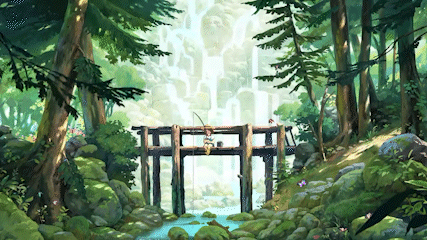
#solarpunk#lunarpunk#hopepunk#utopia#utopian fiction#the power of fiction#the power of media#hope is a dangerous thing#it only needs a spark#fighting climate change
250 notes
·
View notes